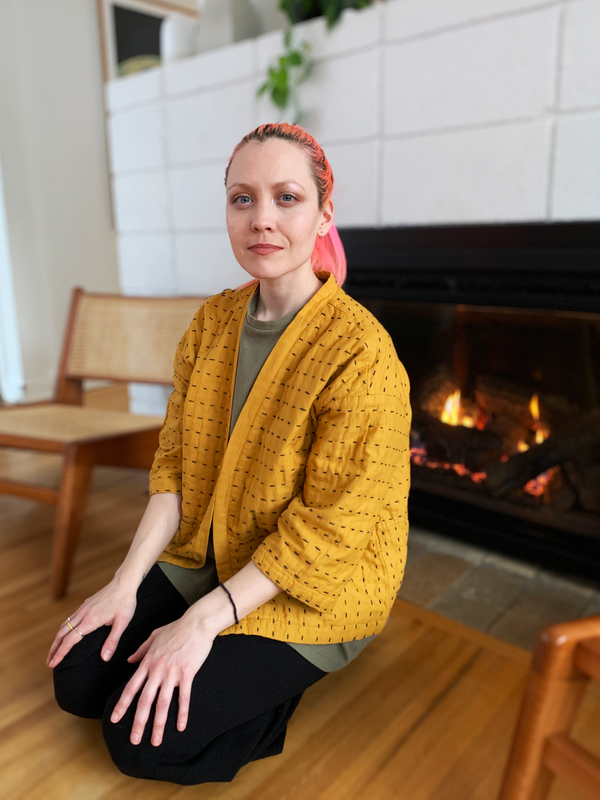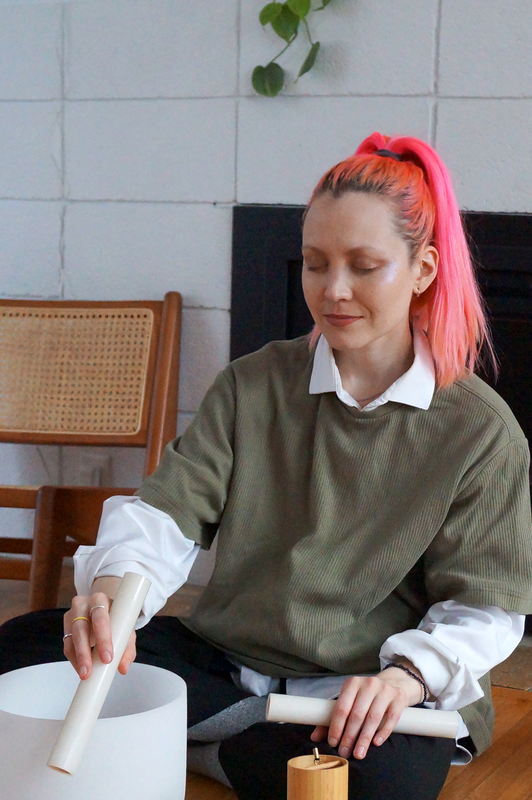Cacie Dalager, CSSP
Certified Somatic Sound Practitioner | She/Her
Sound MeditationFor Neurocomplex Individuals
Private sessions for those who want to experience the healing properties of sound and music as a tool to connect to your body, your body’s wisdom, your intuition, collective consciousness, nature, and deeper levels of your own consciousness. Unique focus on the needs of neurodivergent wiring, using quartz bowls and several kinds of chimes. Meet Cacie. Who I am: I have been in the music industry as a writer, producer, and artist for the last two decades. I was trained in percussion starting at the age of 8 and was in every possible percussion related musical activity growing up. Band, orchestra, drumline, winter drumline, jazz band. I started playing guitar at 14. I started writing and performing my own music in 2005. I am also a digital artist and a co-founder of TART. I started studying/being trained in sound meditation in 2022. I have since completed my certification and training with Andrea Cortez at Mind Body Music Center. |
What I do: I am a somatic sound practitioner. Which means I have learned how to use the healing properties of sound and music as a tool to connect to your body, your body’s wisdom, your intuition, collective consciousness, nature, and deeper levels of your own consciousness. To be present “in your body.” To go even beyond your intellectual mind and utilize your body’s intelligence + the connection between the two. I currently use quartz bowls and several kinds of chimes.
I have shaped my training to focus on the experience of neurcomplexity/neurodivergence. As a neurocomplex being myself, I understand the intensities / complexities / struggles / strengths of existing within a neurocomplex body with a neurocomplex consciousness + wiring. Being still can be a CHALLENGE. I understand the intense drive for our intellectual brains to take over. I understand how chatty our minds can get when we are not constantly moving or distracted. Together we will create a safe space to allow those thoughts to appear and be acknowledged, and then allow them to pass. Or draw attention to what may be helpful.
I would like to stay curious about the concept of intrusive thoughts. More specifically, what we are labeling “intrusive.” Are they intrusive due to when they appear? Are they intrusive due to their message and what they are trying to call attention to? Or is there something important in these thoughts that we keep pushing away?
I have shaped my training to focus on the experience of neurcomplexity/neurodivergence. As a neurocomplex being myself, I understand the intensities / complexities / struggles / strengths of existing within a neurocomplex body with a neurocomplex consciousness + wiring. Being still can be a CHALLENGE. I understand the intense drive for our intellectual brains to take over. I understand how chatty our minds can get when we are not constantly moving or distracted. Together we will create a safe space to allow those thoughts to appear and be acknowledged, and then allow them to pass. Or draw attention to what may be helpful.
I would like to stay curious about the concept of intrusive thoughts. More specifically, what we are labeling “intrusive.” Are they intrusive due to when they appear? Are they intrusive due to their message and what they are trying to call attention to? Or is there something important in these thoughts that we keep pushing away?
Common misconceptions about sound meditation:That there is a goal of relaxation. It is true that decreased anxiety and lowered levels of stress are known effects of sound mediation. There is a physiological shift that happens due to the physical nature of sound waves resonating with your body. But the point of the practice is to be present. To be present with stillness. Not to be actively suppressing any thoughts or feelings or movements. To allow a thought to arise, and allow it to pass. To learn to hold only that present moment. The past and the future are where the stickiness of emotions reside. The practice of sound meditation does not require you to “be calm” to receive its benefits. There is a perfectionistic tendency that can arise with “meditating perfectly” due to attachment to an outcome. Not all sound is healing. Therefore, not all services which utilize sound meditation instruments are healing. The way in which these instruments are played is not always healing. Which is why it is really important to have studied under someone or to have been trained and to remain open + constantly be learning. Benefits of regular practice of sound meditation:-Deeper connection to self -Deeper connection to nature -Deeper connection to intuition -Increased spiritual wellbeing -Decreased tension in the body -Ability to remain present -Lowered levels of anxiety and stress -Ability to listen to your body, leading to catching and preventing burnout (autism, career, creative, life burnout) -Enhanced creative flow |
Cacie's Rates:
|
Curious about how sound meditation may positively interact with your neurocomplex wiring?
Cacie does her own scheduling, so please contact her directly using this connection form.



